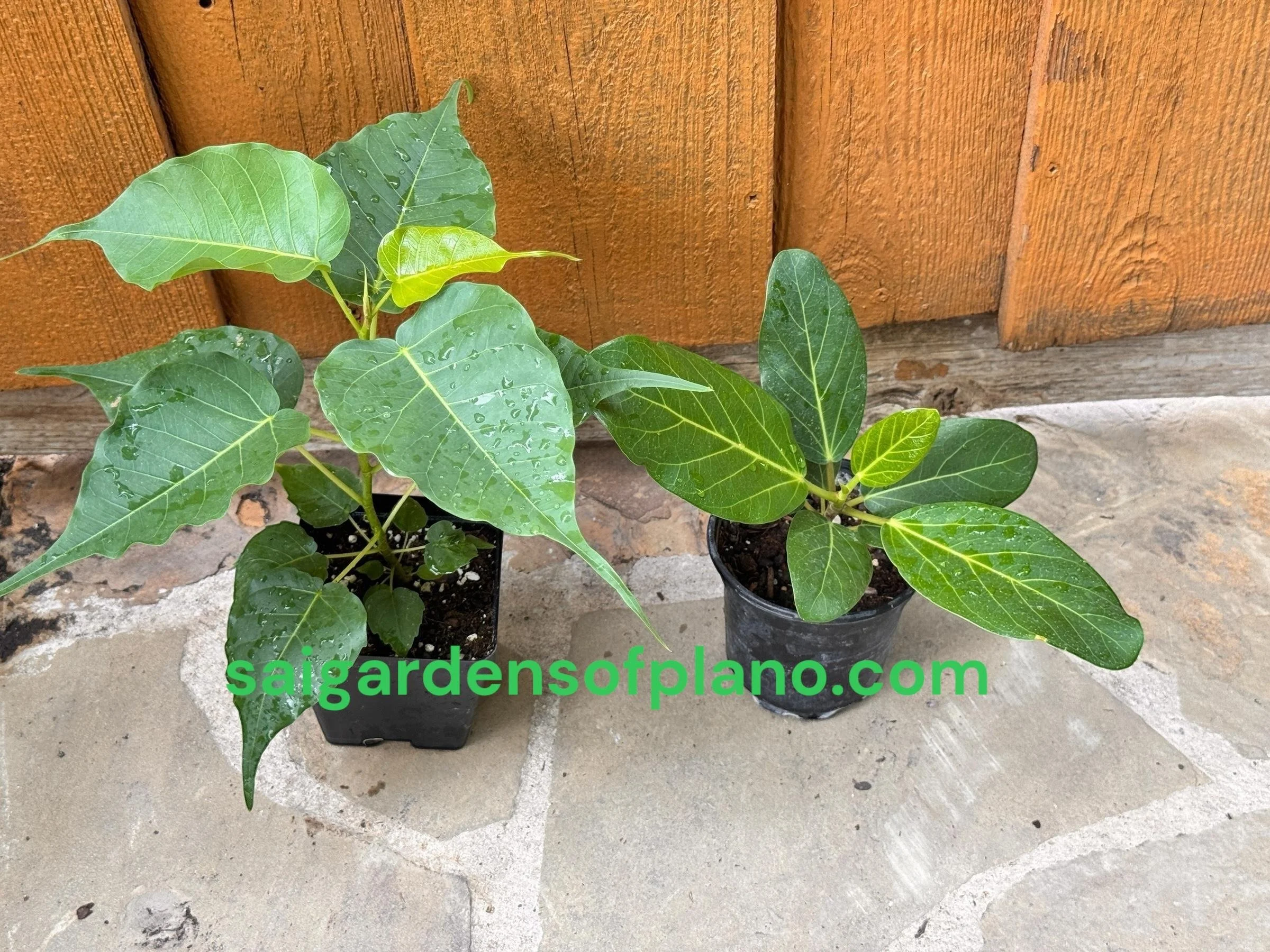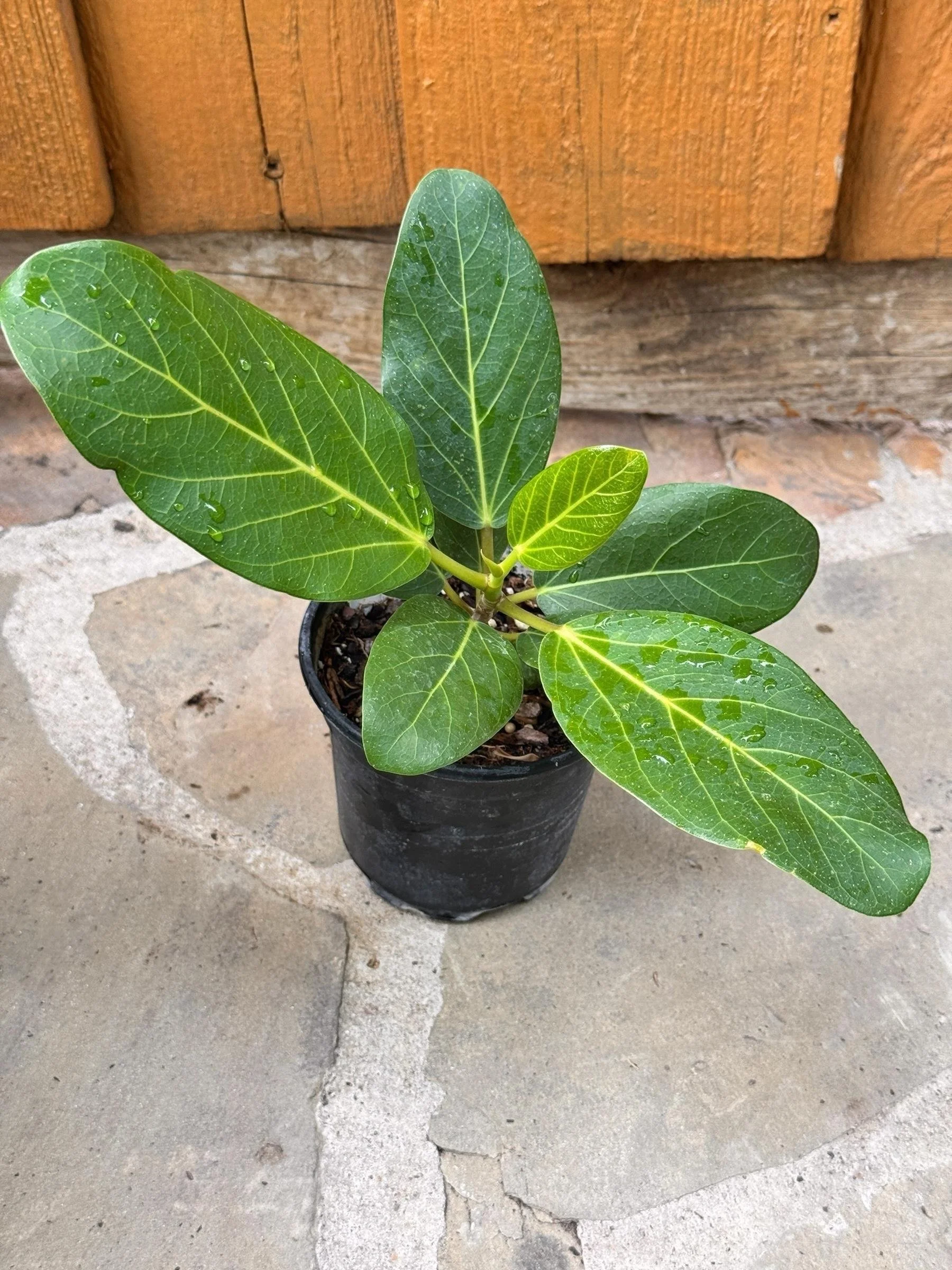 Image 1 of 3
Image 1 of 3

 Image 2 of 3
Image 2 of 3

 Image 3 of 3
Image 3 of 3




Vastu Combo (Peepal and Banyan) Sacred plants (Free Shipping)
You get two plants in this combo. Plants ship for free with this bundle.
Banyan plant in 4 inch pot
Pepal/ Arasamaram plant in 4inch pot
The Peepal and Banyan trees, both belonging to the genus Ficus, hold profound religious and cultural significance, particularly in the Indian subcontinent. They are deeply revered in Hinduism, Buddhism, and Jainism. While they share some symbolic connections, each tree also has its own distinct mythology and rituals.
The Peepal Tree (Ficus religiosa)
The Peepal tree is often considered the most sacred of the two, especially in Buddhism.
* Buddhism: The Peepal tree is famously known as the Bodhi Tree, the tree under which Gautama Buddha attained enlightenment in Bodh Gaya, India. This event makes the tree a powerful symbol of spiritual awakening, wisdom, and the path to liberation.
* Hinduism: The Peepal tree, also known as the Ashvattha, is mentioned extensively in Hindu scriptures. It is believed to be the abode of the Hindu trinity:
* Brahma resides in its roots.
* Vishnu resides in its trunk.
* Shiva resides in its leaves.
* Lord Krishna, in the Bhagavad Gita, famously says, "Among trees, I am the Peepal."
* Goddess Lakshmi is also believed to reside in the tree, particularly on Saturdays, and worshipping the tree on this day is thought to bring prosperity.
* Circumambulating the tree (parikrama) is a common ritual, and it is believed to remove sins and bring blessings.
* Other Beliefs: The Peepal tree is also associated with longevity, protection, and the connection between the earthly and divine realms. It is often a central feature of temples and village squares.
The Banyan Tree (Ficus benghalensis)
The Banyan tree, with its vast canopy and aerial roots, is a symbol of strength, immortality, and eternal life. It has been designated as the national tree of India.
* Hinduism: The Banyan tree is often associated with the concept of immortality and the cosmic "world tree."
* It is considered the Kalpavriksha, or the wish-fulfilling tree, in some traditions.
* Its aerial roots, which grow down to form new trunks, symbolize its eternal nature. This is why it is often called Bahupada ("one with many feet").
* The Banyan tree is connected with the god Shiva, who is often depicted as the divine teacher Dakshinamurti meditating under a Banyan tree.
* The Vat Savitri festival is a major ritual where married women worship the Banyan tree and pray for the long life of their husbands.
* Buddhism and Jainism: In some Buddhist and Jain texts, the Banyan tree is also mentioned in connection with spiritual growth and enlightenment.
You get two plants in this combo. Plants ship for free with this bundle.
Banyan plant in 4 inch pot
Pepal/ Arasamaram plant in 4inch pot
The Peepal and Banyan trees, both belonging to the genus Ficus, hold profound religious and cultural significance, particularly in the Indian subcontinent. They are deeply revered in Hinduism, Buddhism, and Jainism. While they share some symbolic connections, each tree also has its own distinct mythology and rituals.
The Peepal Tree (Ficus religiosa)
The Peepal tree is often considered the most sacred of the two, especially in Buddhism.
* Buddhism: The Peepal tree is famously known as the Bodhi Tree, the tree under which Gautama Buddha attained enlightenment in Bodh Gaya, India. This event makes the tree a powerful symbol of spiritual awakening, wisdom, and the path to liberation.
* Hinduism: The Peepal tree, also known as the Ashvattha, is mentioned extensively in Hindu scriptures. It is believed to be the abode of the Hindu trinity:
* Brahma resides in its roots.
* Vishnu resides in its trunk.
* Shiva resides in its leaves.
* Lord Krishna, in the Bhagavad Gita, famously says, "Among trees, I am the Peepal."
* Goddess Lakshmi is also believed to reside in the tree, particularly on Saturdays, and worshipping the tree on this day is thought to bring prosperity.
* Circumambulating the tree (parikrama) is a common ritual, and it is believed to remove sins and bring blessings.
* Other Beliefs: The Peepal tree is also associated with longevity, protection, and the connection between the earthly and divine realms. It is often a central feature of temples and village squares.
The Banyan Tree (Ficus benghalensis)
The Banyan tree, with its vast canopy and aerial roots, is a symbol of strength, immortality, and eternal life. It has been designated as the national tree of India.
* Hinduism: The Banyan tree is often associated with the concept of immortality and the cosmic "world tree."
* It is considered the Kalpavriksha, or the wish-fulfilling tree, in some traditions.
* Its aerial roots, which grow down to form new trunks, symbolize its eternal nature. This is why it is often called Bahupada ("one with many feet").
* The Banyan tree is connected with the god Shiva, who is often depicted as the divine teacher Dakshinamurti meditating under a Banyan tree.
* The Vat Savitri festival is a major ritual where married women worship the Banyan tree and pray for the long life of their husbands.
* Buddhism and Jainism: In some Buddhist and Jain texts, the Banyan tree is also mentioned in connection with spiritual growth and enlightenment.
You get two plants in this combo. Plants ship for free with this bundle.
Banyan plant in 4 inch pot
Pepal/ Arasamaram plant in 4inch pot
The Peepal and Banyan trees, both belonging to the genus Ficus, hold profound religious and cultural significance, particularly in the Indian subcontinent. They are deeply revered in Hinduism, Buddhism, and Jainism. While they share some symbolic connections, each tree also has its own distinct mythology and rituals.
The Peepal Tree (Ficus religiosa)
The Peepal tree is often considered the most sacred of the two, especially in Buddhism.
* Buddhism: The Peepal tree is famously known as the Bodhi Tree, the tree under which Gautama Buddha attained enlightenment in Bodh Gaya, India. This event makes the tree a powerful symbol of spiritual awakening, wisdom, and the path to liberation.
* Hinduism: The Peepal tree, also known as the Ashvattha, is mentioned extensively in Hindu scriptures. It is believed to be the abode of the Hindu trinity:
* Brahma resides in its roots.
* Vishnu resides in its trunk.
* Shiva resides in its leaves.
* Lord Krishna, in the Bhagavad Gita, famously says, "Among trees, I am the Peepal."
* Goddess Lakshmi is also believed to reside in the tree, particularly on Saturdays, and worshipping the tree on this day is thought to bring prosperity.
* Circumambulating the tree (parikrama) is a common ritual, and it is believed to remove sins and bring blessings.
* Other Beliefs: The Peepal tree is also associated with longevity, protection, and the connection between the earthly and divine realms. It is often a central feature of temples and village squares.
The Banyan Tree (Ficus benghalensis)
The Banyan tree, with its vast canopy and aerial roots, is a symbol of strength, immortality, and eternal life. It has been designated as the national tree of India.
* Hinduism: The Banyan tree is often associated with the concept of immortality and the cosmic "world tree."
* It is considered the Kalpavriksha, or the wish-fulfilling tree, in some traditions.
* Its aerial roots, which grow down to form new trunks, symbolize its eternal nature. This is why it is often called Bahupada ("one with many feet").
* The Banyan tree is connected with the god Shiva, who is often depicted as the divine teacher Dakshinamurti meditating under a Banyan tree.
* The Vat Savitri festival is a major ritual where married women worship the Banyan tree and pray for the long life of their husbands.
* Buddhism and Jainism: In some Buddhist and Jain texts, the Banyan tree is also mentioned in connection with spiritual growth and enlightenment.



